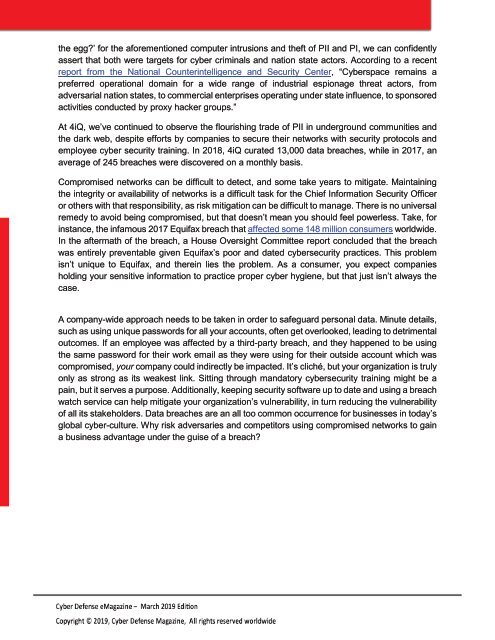CDM-CYBER-DEFENSE-eMAGAZINE-March-2019
You also want an ePaper? Increase the reach of your titles
YUMPU automatically turns print PDFs into web optimized ePapers that Google loves.
the egg?’ for the aforementioned computer intrusions and theft of PII and PI, we can confidently<br />
assert that both were targets for cyber criminals and nation state actors. According to a recent<br />
report from the National Counterintelligence and Security Center, “Cyberspace remains a<br />
preferred operational domain for a wide range of industrial espionage threat actors, from<br />
adversarial nation states, to commercial enterprises operating under state influence, to sponsored<br />
activities conducted by proxy hacker groups.”<br />
At 4iQ, we’ve continued to observe the flourishing trade of PII in underground communities and<br />
the dark web, despite efforts by companies to secure their networks with security protocols and<br />
employee cyber security training. In 2018, 4iQ curated 13,000 data breaches, while in 2017, an<br />
average of 245 breaches were discovered on a monthly basis.<br />
Compromised networks can be difficult to detect, and some take years to mitigate. Maintaining<br />
the integrity or availability of networks is a difficult task for the Chief Information Security Officer<br />
or others with that responsibility, as risk mitigation can be difficult to manage. There is no universal<br />
remedy to avoid being compromised, but that doesn’t mean you should feel powerless. Take, for<br />
instance, the infamous 2017 Equifax breach that affected some 148 million consumers worldwide.<br />
In the aftermath of the breach, a House Oversight Committee report concluded that the breach<br />
was entirely preventable given Equifax’s poor and dated cybersecurity practices. This problem<br />
isn’t unique to Equifax, and therein lies the problem. As a consumer, you expect companies<br />
holding your sensitive information to practice proper cyber hygiene, but that just isn’t always the<br />
case.<br />
A company-wide approach needs to be taken in order to safeguard personal data. Minute details,<br />
such as using unique passwords for all your accounts, often get overlooked, leading to detrimental<br />
outcomes. If an employee was affected by a third-party breach, and they happened to be using<br />
the same password for their work email as they were using for their outside account which was<br />
compromised, your company could indirectly be impacted. It’s cliché, but your organization is truly<br />
only as strong as its weakest link. Sitting through mandatory cybersecurity training might be a<br />
pain, but it serves a purpose. Additionally, keeping security software up to date and using a breach<br />
watch service can help mitigate your organization’s vulnerability, in turn reducing the vulnerability<br />
of all its stakeholders. Data breaches are an all too common occurrence for businesses in today’s<br />
global cyber-culture. Why risk adversaries and competitors using compromised networks to gain<br />
a business advantage under the guise of a breach?



